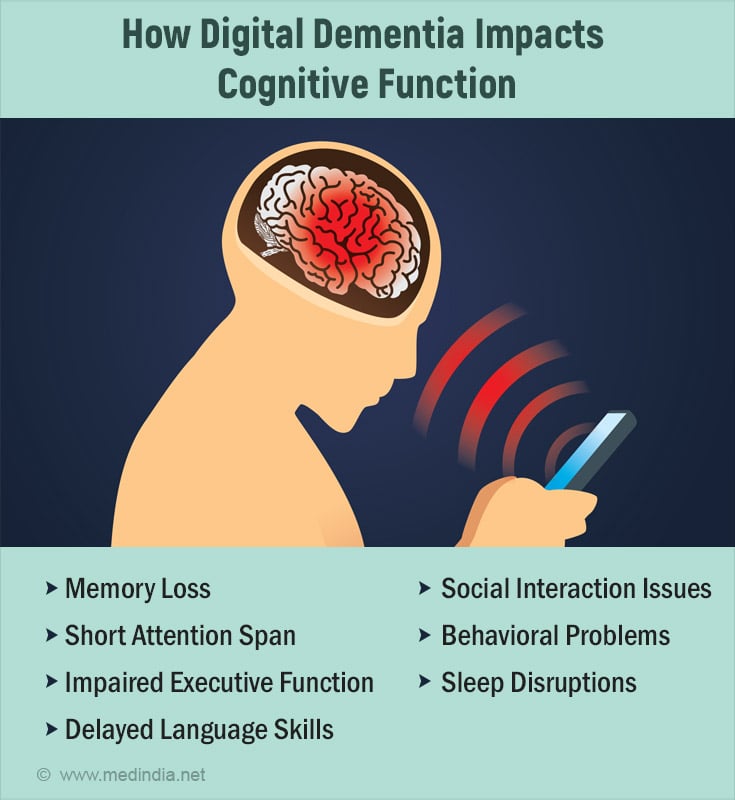- DIGITAL DEMENTIA: HOW SCREENS AND DIGITAL DEVICES IMPACT MEMORY - (https://www.neurocenternj.com/blog/digital-dementia-how-screens-and-digital-devices-impact-memory/)
- Digital Dementia And 7 Tips To Help YOU and YOUR Family Avoid It Today - (https://everydayperformancetherapy.co.uk/digital-dementia-and-7-tips-to-help-you-and-your-family-avoid-it-today/)
About
One alarming concept that has gained attention is "digital dementia," a term coined to describe the cognitive decline that may result from excessive screen time(1✔ ✔Trusted Source
DIGITAL DEMENTIA: HOW SCREENS AND DIGITAL DEVICES IMPACT MEMORY
Go to source).
In today’s digital age, screens are everywhere. From smartphones and tablets to computers and televisions, screen time has become a significant part of daily life. However, as screen usage increases, so does the concern about its impact on our cognitive health.
Did You Know?
Overusing digital devices can shrink your attention span to less than 8 seconds. #Digitaldementia #medindia #screentime
What is Digital Dementia?
Digital dementia refers to the deterioration of cognitive abilities, such as memory, attention, and executive function, often associated with over-reliance on digital technology. The term draws a parallel between the cognitive decline seen in conditions like dementia and the potential effects of prolonged screen exposure. While digital dementia is not a medically recognized diagnosis, the concept highlights growing concerns about the impact of screen time on brain health.
The Link Between Excessive Screen Time and Cognitive Decline
Excessive screen time can lead to several adverse effects on cognitive performance. The constant exposure to digital devices may contribute to:
- Memory Impairment: Over-reliance on devices for information retrieval can weaken memory retention, as the brain becomes less practiced at recalling information independently.
- Decreased Attention Span: Constant multitasking and rapid information consumption on digital platforms can lead to shortened attention spans and difficulty focusing on tasks.
- Reduced Executive Function: Executive functions, such as problem-solving and decision-making, may decline with prolonged screen use, especially when it replaces activities that stimulate the brain.

Risks for Children and Adolescens
Children and adolescents are particularly vulnerable to the effects of excessive screen time. During these critical developmental periods, the brain undergoes significant growth and change. High screen exposure can hinder this process, potentially leading to long-term consequences such as:
- Delayed Language Development: Excessive screen time can interfere with language acquisition and communication skills, particularly in young children.
- Impaired Social Interaction: Overuse of digital devices can reduce face-to-face interactions, limiting opportunities for social development and emotional intelligence.
- Behavioral Issues: High screen time has been linked to increased irritability, attention problems, and even symptoms of depression and anxiety.
- Sleep Disturbances: The blue light emitted by screens can disrupt sleep patterns, which are crucial for cognitive function.
- Fine Motor Impairment: Typing the notes in laptop and smartphone instead of writing it down from young age might cause decline in development of fine motor skills which are crucial for brain development.
Tips to Counteract the Harmful Effects of Excessive Screen Time
While screens are an integral part of modern life, it’s essential to manage their use to protect cognitive health(2✔ ✔Trusted Source
Digital Dementia And 7 Tips To Help YOU and YOUR Family Avoid It Today
Go to source). Some strategies to help counteract the negative effects of excessive screen time are:
1. Set Screen Time Limits
Establish daily screen time limits for both adults and children. The American Academy of Pediatrics recommends no more than one hour of screen time per day for children aged 2 to 5 years. For older children and adults, balancing screen time with offline activities is crucial.
2. Encourage Offline Activities
Promote activities that don’t involve screens, such as reading, outdoor play, and hobbies like painting, music, or puzzles. Engaging in offline activities helps stimulate different areas of the brain and promotes cognitive health.
3. Prioritize Face-to-Face Interaction
Make time for in-person conversations and social interactions. Face-to-face communication is essential for emotional well-being and helps strengthen interpersonal skills.
4. Incorporate Physical Activity
Regular physical activity is beneficial for both the body and mind. Exercise increases blood flow to the brain, supports neuroplasticity, and reduces stress, all of which can counteract the cognitive strain from screen use.
5. Practice Mindfulness and Digital Detoxes
Incorporate mindfulness practices, such as meditation and deep breathing, to reduce screen-induced stress. Periodic digital detoxes, where you take a break from all screens, can help reset your brain and reduce dependency on technology.
6. Create Tech-Free Zones
Designate certain areas of the home, like bedrooms or dining areas, as tech-free zones. This encourages screen-free time and promotes healthier habits, such as better sleep and family bonding.
The rise of digital technology has brought about incredible advances, but it has also introduced challenges to cognitive health. While the concept of digital dementia serves as a cautionary tale, it’s important to recognize that screen time, when managed appropriately, can coexist with a healthy lifestyle. By setting boundaries, prioritizing offline activities, and practicing mindfulness, we can mitigate the risks associated with excessive screen time and protect our cognitive well-being in the digital age.
 MEDINDIA
MEDINDIA

 Email
Email







